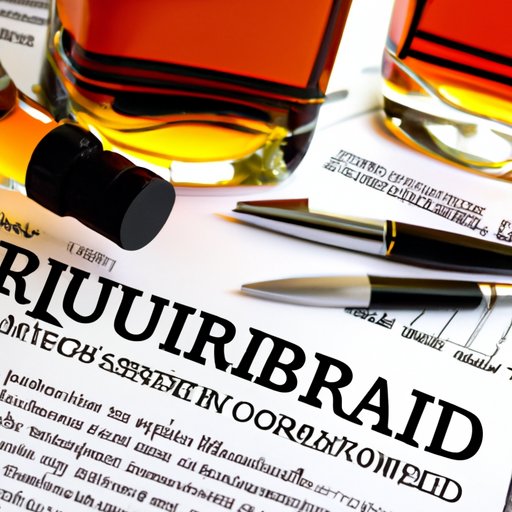Introduction
Starting a liquor brand is an exciting and rewarding venture. Whether you are looking to create a craft whiskey, gin, or vodka, there are several steps that must be taken to ensure the success of your business. In this article, we will provide a comprehensive guide to help you get started.

Research the Licensing Requirements for Starting a Liquor Brand
The first step in starting your own liquor brand is to understand the federal and state regulations that govern the industry. Depending on where you live, you may be required to obtain a license or permit in order to manufacture, distribute, and sell alcohol. It is important to research the specific regulations in your area as they vary greatly from state to state. Additionally, you may need to register with the Alcohol and Tobacco Tax and Trade Bureau (TTB), which regulates the production, distribution, and sale of alcohol in the United States.
Once you have determined the licensing requirements, you can begin the process of applying for the necessary permits and licenses. Depending on the type of business you are planning to run, you may need to obtain a manufacturer’s license, wholesaler’s license, importer’s license, and/or retail license. Additionally, you may need to apply for a federal basic permit from the TTB, which allows you to produce, bottle, and label your product.
Develop a Business Plan and Conduct Market Research
The next step in starting your own liquor brand is to create a detailed business plan. This plan should include information about your product, target market, pricing strategy, marketing strategy, and financial projections. You should also consider conducting market research to determine the size and composition of your potential customer base and the trends in the industry.
Market research can help you identify opportunities and threats to your business and inform decisions about pricing, branding, and promotional activities. Additionally, it can help you identify potential competitors and assess their strengths and weaknesses. Finally, it can provide valuable insights into consumer behavior and preferences.
Secure Financing
Once you have developed a business plan and conducted market research, you will need to secure financing for your venture. There are a number of ways to finance a liquor business, including loans from banks and investors, grants, and crowdfunding campaigns. It is important to research all of your options and compare the costs and benefits of each before making a decision.
When seeking financing, it is important to have a clear understanding of your goals and objectives, as well as the risks and rewards associated with each option. Additionally, you should consider the impact of any financing decisions on your ability to meet your financial obligations in the future.

Create a Distinctive Brand Identity
Creating a distinctive brand identity is essential for any business. Developing a logo, packaging, and unique brand story can help differentiate your product from the competition and build loyalty among customers.
Your logo and packaging should be eye-catching and reflect the personality of your brand. Additionally, you should develop a unique brand story that resonates with your target audience and conveys the values of your business. Finally, you should consider creating a website and social media accounts to promote your brand and connect with potential customers.

Source Quality Ingredients and Suppliers
Once you have established a brand identity, you will need to source quality ingredients and suppliers. Identifying potential suppliers and negotiating contracts can take time, so it is important to start the process early. Additionally, you should establish quality control protocols to ensure that your ingredients meet your standards and that your products are safe for consumption.
Conclusion
Starting your own liquor brand is an exciting and rewarding venture. By following the steps outlined in this article, you can be well on your way to launching a successful business. From understanding the licensing requirements to creating a distinctive brand identity and sourcing quality ingredients and suppliers, there is a lot that goes into starting a liquor brand. With the right plan and preparation, you can make your dream of owning a liquor brand a reality.
(Note: Is this article not meeting your expectations? Do you have knowledge or insights to share? Unlock new opportunities and expand your reach by joining our authors team. Click Registration to join us and share your expertise with our readers.)
